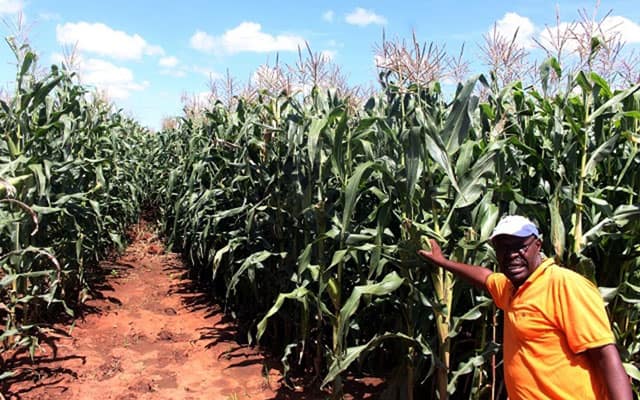Zimbabwe is affected by corruption just like any other country in the world. Corruption has debilitating effects and affects the most vulnerable citizens, the women, the children, and the elderly at most. For the past two decades the Zimbabwean economy has been on the meltdown and one of the major causes has been corruption. Although the Government showed its political will by ensuring the establishment of a national anti-corruption body there are so many challenges which came about.
In 2015, the government of Zimbabwe launched the Command Agriculture programme. The programme has been run by the military, which organised the procurement of inputs and supervised their distribution to farmers. Inputs were initially provided by way of loans to the farmers with their debts being guaranteed by the State. However, there was a high default rate on the loans – 85 per cent – so the State as guarantor of the loans has had to bear most of the cost of the programme. Between 2015 and 2018 the programme was funded outside the national budget, and an amount of US$3 billion in unbudgeted funds was expended on the programme during this period. The US$3 billion came to public notice when the Auditor-General revealed it as unappropriated expenditure when she appeared before the Public Accounts Committee. It can be noted that a programme meant to benefit the farmers was mismanaged leading to misappropriation of state funds.
Corruption in Zimbabwe
One of the main issues that has bedeviled Africa is corruption. Corruption cases are on the rise, and this has negatively affected the development of the African continent. Thomas Hobbes alluded to the fact that man is naturally selfish, and this has been the case in most African countries as public officials have turned to corruption for their own personal gain. The concept of power also directly explains why corruption is on the rise. Lord Acton in 1887 argued that power is corrupt and absolute power corrupts absolutely. Those in top positions have constantly abused their power hence it has become a challenge to fully eradicate corruption. According to Dike (2007:1-19), corruption is the violation of established rules for self – gains. It is the effort to secure wealth or power through illegitimate means at the public expense. Corruption in most state public enterprises manifests itself in the form of bribery, embezzlement, fraud, extortion, abuse of power, conflict of interest, favouritism, ghosting, nepotism, and graft (Shana 2006:1). Corruption is primarily a result of poor governance, thus a solid framework of administrative strategies to manage society’s needs is required across state public enterprises. When formal systems break down in governance, it becomes harder to implement and enforce laws and policies that ensure accountability and transparency (UNDP 2004:2) in the management of public activities.
This paper will describe a corruption case that transpired in Zimbabwe. Corruption in Zimbabwe has become endemic within its political, private, and civil sectors. Zimbabwe ranks 157th out of 180 countries in the 2021 Transparency International Corruption Perceptions Index where a high ranking corresponds to a perception of high corruption in the public sector. On a scale of 0 (highly corrupt) to 100 (very clean), the Corruption Perceptions Index gave Zimbabwe a score of 23. The government of Zimbabwe has made several strides in creating legislation and bodies that deal with corruption in the country. The Zimbabwean Anti-Corruption Commission (ZACC) was established after the passing of the Anti-Corruption Commission Bill in June 2004. The Commission is a signatory to the Southern Africa Development Community (SADC) Protocol as well as the African Union (AU) and United Nations Convention on Anti-Corruption. However, according to a 2009 report by Global Integrity, the Commission is highly inefficient and “has very little authority to take steps aimed at stopping corruption in Zimbabwe”. Out of 147 corruption cases reviewed by the Commission in 2006, only four were completed. It is however important to note that corruption cases in the country are mostly centred within the executive, as the leaders are the ones who are at the top of instigating corruption tendencies. Corruption in Zimbabwe has been manifested in the form of bribery, embezzlement, fraud, extortion, abuse of power, conflict of interest, favouritism, ghosting, nepotism and patronage politics. According to Transparency International, corruption is costing the country $2bn annually (Kunaka,and Matsheza, 2020)
Command Agriculture Scandal
The Targeted Command Agriculture is a Zimbabwean agricultural scheme aimed at ensuring food self-sufficiency that was introduced at the start of the 2016 – 2017 farming season following the drought of the previous season. The scheme was introduced as Zimbabwe struggled with economic problems which include persistent high inflation, slow structural transformation, high dependence on low productivity agriculture caused by natural disasters such as drought. It was announced in August 2016 (Pindula, 2017).
The scheme targeted farmers near water bodies who could put a minimum of 200 hectares under maize per individual. These were found to be 2,000 in total and each farmer was required to produce at least 1,000 tonnes of maize. Each participating farmer was required to commit 5 tonnes per hectare towards repayment of advanced loans in the form of irrigation equipment, inputs, and chemicals, mechanized equipment, electricity, and water charges. Farmers would retain a surplus product produced more than 1,000 tonnes. The programme cost $500 million. Each farmer was earmarked to receive US$250,000. The programme has been plagued by corruption scandals, poor delivery and costs a small fortune due to poor repayment patterns. There are allegations of possible abuse of funds under the controversial command agriculture scheme amid claims that there are no records and accountability of how close to US$3 billion was disbursed. According to Lands and Agriculture ministry permanent secretary Ringson Chitsiko, and the ministry’s finance director Peter Mudzamiri, the US$3 billion cited in Auditor-General Mildred Chiri’s 2018 report never reached the ministry. Records to show how the funds were utilised were not available (The Independent, 2019). The Auditor General noted that US$3 billion was never documented and hence cannot be accounted for. The funding disappeared through the system and the authorities are clueless on how the money was used.
The failure to account for the US$3 billion means the government is running a shadowy parallel fiscal structure, funding corrupt and self-serving programmes. The command agriculture scheme run by the Office of the President and Cabinet has in the past been implicated for several corrupt activities where names of fictitious resettled farmers were smuggled into the beneficiaries’ list while some agricultural extension officers were nabbed after selling inputs meant for the scheme.
Recommendations
Command Agriculture was a plan that seemed sensible on paper, but was described by Minister of Finance, Professor Mthuli Ncube, as a programme that “created opportunities for arbitrage, leakages and corruption”, (Ministry of Finance and Economic Development. 2019. 2020 Annual Budget Statement, Ministry of Finance and Economic Development). There was a need for the Office of the President to decentralize the programme so that other sectors could focus on it. In most instances the Office of the President is overwhelmed by other responsibilities and spearheading the programme created loopholes for manipulations, mismanagement and corruption.
Successful production and implementation of Command Agriculture can be facilitated through land administration policy – including land audits and forms of taxation – that encourages more intensive, commercial use. But farm investment will only flow if the conditions are right, which means getting the leases issued, the contestation over land resolved through land compensation and private and public finance made available in flexible forms, and not through state schemes that are prone to corruption and patronage. Hence the government needs a land policy that audits the land use as well as the finances that are being administered to the farmers. Land audits will also be vital for making sure that the people getting financing for agriculture have land.
A decentralised electronic data management is proposed, along with the capacitation of Agritex offices and ‘command centres’. Investigations of abuse are promised, whereby “culprits will be quickly brought to book”. The Zimbabwe Anti-Corruption Commission (ZACC) should open investigations into how some beneficiaries of the government’s controversial Command Agriculture programme abused the scheme, looting inputs and fuel. Command Agriculture is a high-profile plank of economic policy for the ‘new era’ extending from maize and wheat to include soybeans and livestock in the coming season. In line with the wider rhetoric around stamping out corruption, military discipline and well-designed logistics operation must be applied.
All cases of corruption, regardless of form, must be treated as high level criminal cases thus attracting longer and deterrent court sentences. This is because the devastating effects of corruption are felt by the general populace and that must be addressed. If individuals who engage in corruption activities are aware of the dire consequences of corruption, they will not engage in it. Some corrupt activities are not even legislated against, thus those who commit such offences are left free as they cannot be prosecuted.
Valerie Rumbidzai Jeche (Zimbabwe) is a member of the 2022 cohort of the Future Africa Fellowship




